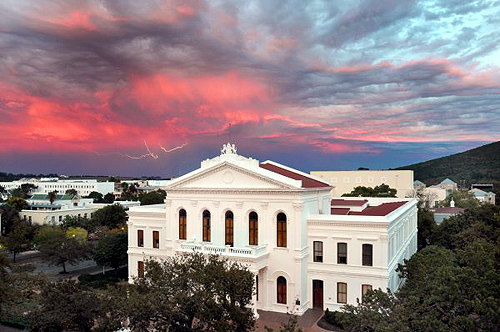 Language is society’s most powerful tool, and it’s under siege in South Africa.
Language is society’s most powerful tool, and it’s under siege in South Africa.
The University of Stellenbosch, the country’s “Afrikaans University,” founded in 1866, the bastion of Boer Culture will no longer employ Afrikaans as a predominant instructional language. Advantage: English.
The issue of instructional language in South Africa’s universities has been under constant debate since the end of apartheid. There are 11 official languages in the country. English, Afrikaans, Zulu and Sotho are the primary ones with English dominating.
But Afrikaans has been a close second. The first European settlers of The Cape more than four hundred years ago were from Holland. Afrikaans is derived from Dutch and became the working language of the South African colony.
Afrikaans was the only language of the first two political entities that declared independence, the Transvaal and Orange Free State.
Colonial languages like higher Spanish, old French, classical Portuguese and the King’s English didn’t last long as their colonies rocketed away from them into independence, and Afrikaans morphed from Dutch remarkably fast to become a sophisticated language of an independent new-world people.
Dutch imperial power collapsed very quickly in the 1800s just as the Afrikaans were on the ascent, but Britain stepped right in to take over from the Dutch. Few places in the world were as important as South Africa to emerging world powers whose ships were trading extensively with Asia.
Afrikaans and English became bitter enemies.
The extraordinary brutality that occurred between the competing British and Afrikaans resulted in several outright wars, concentration camps and massacres the likes of which were not seen again until the atrocities of the World Wars.
Nothing like this happened elsewhere in the world, because of course there were many even earlier native peoples living in South Africa before the Afrikaans who, in fact, the Afrikaans oppressed. Afrikaans culture and politics became apartheid.
So in a 180-degree twist in barely a century, the oppressed Afrikaaners became the oppressors.
Almost 7 million of South Africa’s 53 million people are native Afrikaans speakers, way down from just the last two generations. When I first worked in South Africa in the 1980s more than a third of the population was native Afrikaans speakers.
Luister [which means listen] is a documentary film purporting entrenched racism against non-white, non-Afrikaans speaking students at the University of Stellenbosch (UoS), today.
The powerful student protests that have swept across the country this term have been the catalyst for a wide range of rapid changes in South Africa, and it looks like language policy at UofS is one of them.
The proposed changes are more the nail-in-the-coffin than a revolutionary move. The current policy is for dual-language instruction, Afrikaans with English with translators present in lecture halls. That move a few years ago, which abandoned predominant instruction in Afrikaans, was more significant as it presaged what is now happening.
There seems to be enough maturity in the new South Africa for many to realize that Afrikaans is a mature language that needs help if it isn’t to be swallowed up by English. One of the African leaders of one of the country’s most progressive political parties suggested this week that the UoS policy is not so clearly correct.
Even a United Nations agency suggest some introspection.
In this charged political atmosphere I don’t think the university will reverse itself. And clearly, the deeply rooted Boer culture and its Afrikaans language is not going to disappear because of this.
But as a lover of language and all its nuances and beauties, I admit feeling sad that this very prestigious higher institution is sacrificing such an historic identity to the nondescript functionality of a Twitter World.